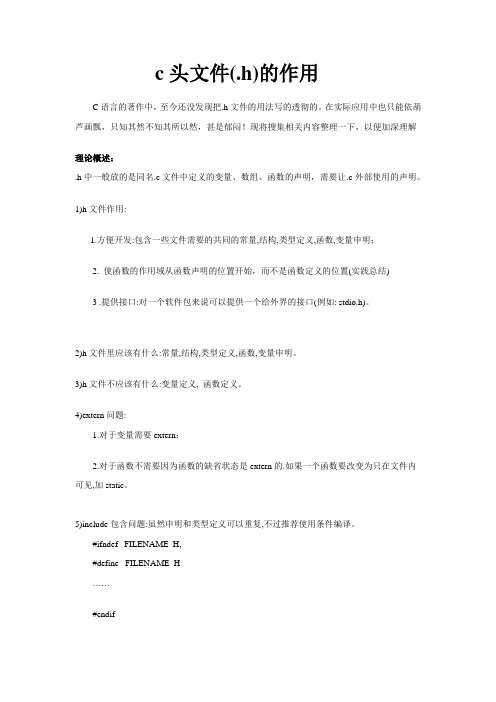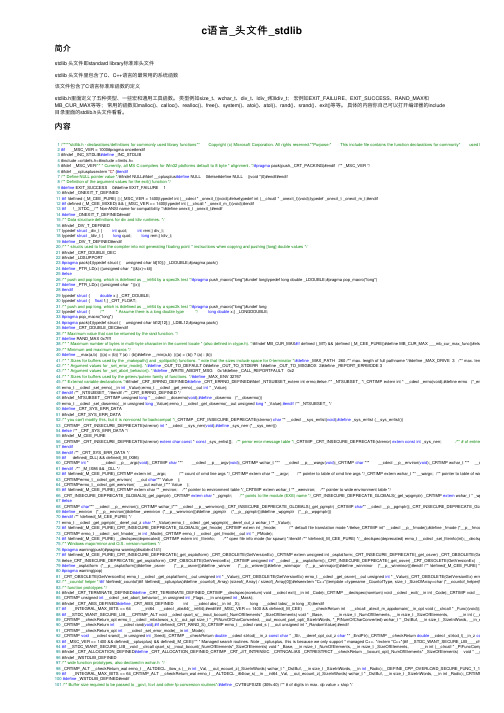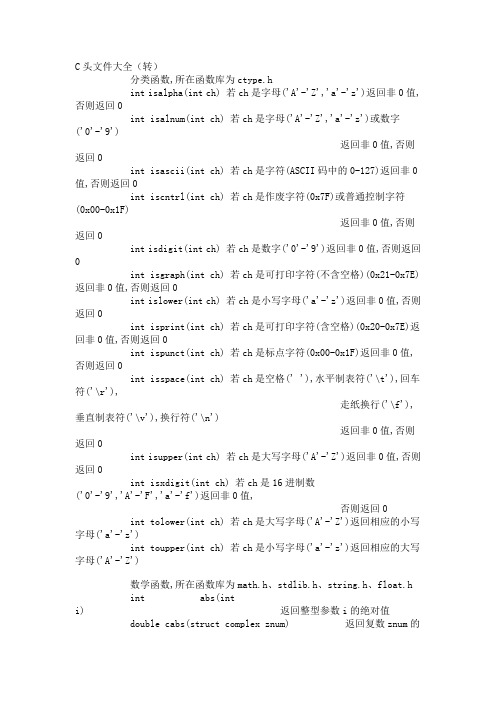c++头文件
c头文件(.h)的作用

c头文件(.h)的作用C语言的著作中,至今还没发现把.h文件的用法写的透彻的。
在实际应用中也只能依葫芦画瓢,只知其然不知其所以然,甚是郁闷!现将搜集相关内容整理一下,以便加深理解理论概述:.h中一般放的是同名.c文件中定义的变量、数组、函数的声明,需要让.c外部使用的声明。
1)h文件作用:1.方便开发:包含一些文件需要的共同的常量,结构,类型定义,函数,变量申明;2. 使函数的作用域从函数声明的位置开始,而不是函数定义的位置(实践总结)3 .提供接口:对一个软件包来说可以提供一个给外界的接口(例如: stdio.h)。
2)h文件里应该有什么:常量,结构,类型定义,函数,变量申明。
3)h文件不应该有什么:变量定义, 函数定义。
4)extern问题:1.对于变量需要extern;2.对于函数不需要因为函数的缺省状态是extern的.如果一个函数要改变为只在文件内可见,加static。
5)include包含问题:虽然申明和类型定义可以重复,不过推荐使用条件编译。
#ifndef _FILENAME_H,#define _FILENAME_H……#endif实践总结:先看最简单的程序:hello world12 main()3 {4 printf("Hello World!\n");5 }注意,test1中并没有.h文件,编译可以顺利通过。
把程序做下改动,下面这个:12 prtstr()3 {4 printf("Hello World!\n");5 }6 main()7 {8 prtstr();9 }test2.c中还是没有.h文件,编译仍可以顺利通过。
再把程序改动下:12 main()3 {4 prtstr();5 }67 prtstr()8 {9 printf("Hello World!\n");10 }test3.c中仍然没有.h文件,编译失败→_→。
C头文件之cstring

C头⽂件之cstring
(string.h)
这个⽂件夹主要是定义了⼏个对字符串和数组进⾏操作的函数。
功能很强⼤。
下⾯是重要函数:
strcpy、strncpy
strcpy,strncpy
这两个函数是对字符串的复制,很常⽤。
memcpy
函数原型:void * memcpy ( void * destination, const void * source, size_t num );。
主要⽤于数组指定的内存之间的复制,⽽不是字符串之间。
将source指定的内存前num个字节复制到destination指定的内存的千numge字节。
memset
函数原型:void * memset ( void * ptr, int value, size_t num );主要⽤于数组的初始化。
将ptr指定的内存的前num个字节初始化为value。
可以⽤于数组初始化,不⽤遍历数组赋值了。
/* memset example */
#include <stdio.h>
#include <string.h>
int main ()
{
char str[] = "almost every programmer should know memset!";
memset (str,'-',sizeof(str));
puts (str);
return0;
}
/*OutPut*/
----------------------------------------------------------。
c语言_头文件_stdlib

c语⾔_头⽂件_stdlib简介stdlib 头⽂件即standard library标准库头⽂件stdlib 头⽂件⾥包含了C、C++语⾔的最常⽤的系统函数该⽂件包含了C语⾔标准库函数的定义stdlib.h⾥⾯定义了五种类型、⼀些宏和通⽤⼯具函数。
类型例如size_t、wchar_t、div_t、ldiv_t和lldiv_t;宏例如EXIT_FAILURE、EXIT_SUCCESS、RAND_MAX和MB_CUR_MAX等等;常⽤的函数如malloc()、calloc()、realloc()、free()、system()、atoi()、atol()、rand()、srand()、exit()等等。
具体的内容你⾃⼰可以打开编译器的include⽬录⾥⾯的stdlib.h头⽂件看看。
内容1/*****stdlib.h - declarations/definitions for commonly used library functions** Copyright (c) Microsoft Corporation. All rights reserved.**Purpose:* This include file contains the function declarations for commonly* used library functio 2#if _MSC_VER > 1000#pragma once#endif3 #ifndef _INC_STDLIB#define _INC_STDLIB4 #include <crtdefs.h>#include <limits.h>5 #ifdef _MSC_VER/** * Currently, all MS C compilers for Win32 platforms default to 8 byte * alignment. */#pragma pack(push,_CRT_PACKING)#endif /** _MSC_VER */6 #ifdef __cplusplusextern "C" {#endif7/** Define NULL pointer value */#ifndef NULL#ifdef __cplusplus#define NULL 0#else#define NULL ((void *)0)#endif#endif8/** Definition of the argument values for the exit() function */9#define EXIT_SUCCESS 0#define EXIT_FAILURE 110 #ifndef _ONEXIT_T_DEFINED11#if !defined (_M_CEE_PURE) || (_MSC_VER < 1400)typedef int (__cdecl * _onexit_t)(void);#elsetypedef int (__clrcall * _onexit_t)(void);typedef _onexit_t _onexit_m_t;#endif12#if defined (_M_CEE_MIXED) && (_MSC_VER >= 1400)typedef int (__clrcall * _onexit_m_t)(void);#endif13#if !__STDC__/** Non-ANSI name for compatibility */#define onexit_t _onexit_t#endif14#define _ONEXIT_T_DEFINED#endif15/** Data structure definitions for div and ldiv runtimes. */16 #ifndef _DIV_T_DEFINED17 typedef struct _div_t { int quot; int rem;} div_t;18 typedef struct _ldiv_t { long quot; long rem;} ldiv_t;19#define _DIV_T_DEFINED#endif20/** * structs used to fool the compiler into not generating floating point * instructions when copying and pushing [long] double values */21 #ifndef _CRT_DOUBLE_DEC22 #ifndef _LDSUPPORT23#pragma pack(4)typedef struct { unsigned char ld[10];} _LDOUBLE;#pragma pack()24#define _PTR_LD(x) ((unsigned char *)(&(x)->ld))25#else26/** push and pop long, which is #defined as __int64 by a spec2k test */#pragma push_macro("long")#undef longtypedef long double _LDOUBLE;#pragma pop_macro("long")27#define _PTR_LD(x) ((unsigned char *)(x))28#endif29 typedef struct { double x;} _CRT_DOUBLE;30 typedef struct { float f;} _CRT_FLOAT;31/** push and pop long, which is #defined as __int64 by a spec2k test */#pragma push_macro("long")#undef long32 typedef struct { /** * Assume there is a long double type */long double x;} _LONGDOUBLE;33#pragma pop_macro("long")34#pragma pack(4)typedef struct { unsigned char ld12[12];} _LDBL12;#pragma pack()35#define _CRT_DOUBLE_DEC#endif36/** Maximum value that can be returned by the rand function. */37#define RAND_MAX 0x7fff38/** * Maximum number of bytes in multi-byte character in the current locale * (also defined in ctype.h). */#ifndef MB_CUR_MAX#if defined (_MT) && (defined (_M_CEE_PURE))#define MB_CUR_MAX ___mb_cur_max_func()#else#define MB_ 39/** Minimum and maximum macros */40#define __max(a,b) (((a) > (b)) ? (a) : (b))#define __min(a,b) (((a) < (b)) ? (a) : (b))41/** * Sizes for buffers used by the _makepath() and _splitpath() functions. * note that the sizes include space for 0-terminator */#define _MAX_PATH 260 /** max. length of full pathname */#define _MAX_DRIVE 3 /** max. length of drive c 42/** * Argument values for _set_error_mode(). */#define _OUT_TO_DEFAULT 0#define _OUT_TO_STDERR 1#define _OUT_TO_MSGBOX 2#define _REPORT_ERRMODE 343/** * Argument values for _set_abort_behavior(). */#define _WRITE_ABORT_MSG 0x1#define _CALL_REPORTFAULT 0x244/** * Sizes for buffers used by the getenv/putenv family of functions. */#define _MAX_ENV 3276745/** External variable declarations */#ifndef _CRT_ERRNO_DEFINED#define _CRT_ERRNO_DEFINED#ifdef _NTSUBSET_extern int errno;#else /** _NTSUBSET_ */_CRTIMP extern int * __cdecl _errno(void);#define errno (*_errno())46 errno_t __cdecl _set_errno(__in int _Value);errno_t __cdecl _get_errno(__out int * _Value);47#endif /** _NTSUBSET_ */#endif /** _CRT_ERRNO_DEFINED */48 #ifndef _NTSUBSET__CRTIMP unsigned long * __cdecl __doserrno(void);#define _doserrno (*__doserrno())49 errno_t __cdecl _set_doserrno(__in unsigned long _Value);errno_t __cdecl _get_doserrno(__out unsigned long * _Value);#endif /** _NTSUBSET_ */50#define _CRT_SYS_ERR_DATA51 #ifndef _CRT_SYS_ERR_DATA52/** you can't modify this, but it is non-const for backcompat */_CRTIMP _CRT_INSECURE_DEPRECATE(strerror) char ** __cdecl __sys_errlist(void);#define _sys_errlist (__sys_errlist())53 _CRTIMP _CRT_INSECURE_DEPRECATE(strerror) int * __cdecl __sys_nerr(void);#define _sys_nerr (*__sys_nerr())54#else /** _CRT_SYS_ERR_DATA */55 #ifndef _M_CEE_PURE56 _CRTIMP _CRT_INSECURE_DEPRECATE(strerror) extern char const * const _sys_errlist[]; /** perror error message table */_CRTIMP _CRT_INSECURE_DEPRECATE(strerror) extern const int _sys_nerr; /** # of entries in sys_errlis 57#endif58#endif /** _CRT_SYS_ERR_DATA */59#if defined(_DLL) && defined(_M_IX86)60 _CRTIMP int * __cdecl __p___argc(void);_CRTIMP char *** __cdecl __p___argv(void);_CRTIMP wchar_t *** __cdecl __p___wargv(void);_CRTIMP char *** __cdecl __p__environ(void);_CRTIMP wchar_t *** __cdecl __p__w 61#endif /** _M_IX86 && _DLL */62#if !defined(_M_CEE_PURE)_CRTIMP extern int __argc; /** count of cmd line args */_CRTIMP extern char ** __argv; /** pointer to table of cmd line args */_CRTIMP extern wchar_t ** __wargv; /** pointer to table of wide cmd line ar63 _CRTIMPerrno_t__cdecl_get_environ( __out char*** Value );64 _CRTIMPerrno_t__cdecl_get_wenviron( __out wchar_t*** Value );65#if !defined(_M_CEE_PURE)_CRTIMP extern char ** _environ; /** pointer to environment table */_CRTIMP extern wchar_t ** _wenviron; /** pointer to wide environment table */66 _CRT_INSECURE_DEPRECATE_GLOBALS(_get_pgmptr) _CRTIMP extern char * _pgmptr; /** points to the module (EXE) name */_CRT_INSECURE_DEPRECATE_GLOBALS(_get_wpgmptr) _CRTIMP extern wchar_t * _wpgmptr;67#else68 _CRTIMP char*** __cdecl __p__environ();_CRTIMP wchar_t*** __cdecl __p__wenviron();_CRT_INSECURE_DEPRECATE_GLOBALS(_get_pgmptr) _CRTIMP char** __cdecl __p__pgmptr();_CRT_INSECURE_DEPRECATE_GLOBALS(_get_ 69#define _environ (*__p__environ())#define _wenviron (*__p__wenviron())#define _pgmptr (*__p__pgmptr())#define _wpgmptr (*__p__wpgmptr())70#endif /** !defined(_M_CEE_PURE) */71 errno_t __cdecl _get_pgmptr(__deref_out_z char ** _Value);errno_t __cdecl _get_wpgmptr(__deref_out_z wchar_t ** _Value);72#if !defined(_M_CEE_PURE)_CRT_INSECURE_DEPRECATE_GLOBALS(_get_fmode) _CRTIMP extern int _fmode; /** default file translation mode */#else_CRTIMP int* __cdecl __p__fmode();#define _fmode (*__p__fmode())#endif /** 73 _CRTIMP errno_t __cdecl _set_fmode(__in int _Mode);_CRTIMP errno_t __cdecl _get_fmode(__out int * _PMode);74#if !defined(_M_CEE_PURE) __declspec(deprecated) _CRTIMP extern int _fileinfo; /** open file info mode (for spawn) */#endif /** !defined(_M_CEE_PURE) */__declspec(deprecated) errno_t __cdecl _set_fileinfo(int);__declspec(deprecate 75/** Windows major/minor and O.S. version numbers */76#pragma warning(push)#pragma warning(disable:4141)77#if !defined(_M_CEE_PURE)_CRT_INSECURE_DEPRECATE(_get_osplatform) _CRT_OBSOLETE(GetVersionEx) _CRTIMP extern unsigned int _osplatform;_CRT_INSECURE_DEPRECATE(_get_osver) _CRT_OBSOLETE(GetVersionEx) 78 #else_CRT_INSECURE_DEPRECATE(_get_osplatform) _CRT_OBSOLETE(GetVersionEx) _CRTIMP unsigned int* __cdecl __p__osplatform();_CRT_INSECURE_DEPRECATE(_get_osver) _CRT_OBSOLETE(GetVersionEx) _CRTIMP uns 79#define _osplatform (*__p__osplatform())#define _osver (*__p__osver())#define _winver (*__p__winver())#define _winmajor (*__p__winmajor())#define _winminor (*__p__winminor())#endif /** !defined(_M_CEE_PURE) */80#pragma warning(pop)81 _CRT_OBSOLETE(GetVersionEx) errno_t __cdecl _get_osplatform(__out unsigned int * _Value);_CRT_OBSOLETE(GetVersionEx) errno_t __cdecl _get_osver(__out unsigned int * _Value);_CRT_OBSOLETE(GetVersionEx) errno_t __cdecl _ 82/** _countof helper */#if !defined(_countof)#if !defined(__cplusplus)#define _countof(_Array) (sizeof(_Array) / sizeof(_Array[0]))#elseextern "C++"{template <typename _CountofType, size_t _SizeOfArray>char (*__countof_helper(UNALIGNED 83/** function prototypes */84 #ifndef _CRT_TERMINATE_DEFINED#define _CRT_TERMINATE_DEFINED_CRTIMP __declspec(noreturn) void __cdecl exit(__in int _Code);_CRTIMP __declspec(noreturn) void __cdecl _exit(__in int _Code);_CRTIMP void __cdecl abort(v85 _CRTIMP unsigned int __cdecl _set_abort_behavior(__in unsigned int _Flags, __in unsigned int _Mask);86 #ifndef _CRT_ABS_DEFINED#define _CRT_ABS_DEFINED int __cdecl abs(__in int _X); long __cdecl labs(__in long _X);#endif87#if _INTEGRAL_MAX_BITS >= 64 __int64 __cdecl _abs64(__int64);#endif#if _MSC_VER >= 1400 && defined(_M_CEE) __checkReturn int __clrcall _atexit_m_appdomain(__in_opt void (__clrcall * _Func)(void));#if defined(_M 88#if __STDC_WANT_SECURE_LIB___CRTIMP_ALT void __cdecl qsort_s(__inout_bcount(_NumOfElements* _SizeOfElements) void * _Base, __in rsize_t _NumOfElements, __in rsize_t _SizeOfElements, __in int (__cdecl * _PtFu89 _CRTIMP __checkReturn_opt errno_t __cdecl _mbstowcs_s_l(__out_opt size_t * _PtNumOfCharConverted, __out_ecount_part_opt(_SizeInWords, *_PtNumOfCharConverted) wchar_t * _DstBuf, __in size_t _SizeInWords, __in_ecount_z(_Ma90 _CRTIMP __checkReturn int __cdecl rand(void);#if defined(_CRT_RAND_S)_CRTIMP errno_t __cdecl rand_s ( __out unsigned int *_RandomValue);#endif91 _CRTIMP __checkReturn_opt int __cdecl _set_error_mode(__in int _Mode);92 _CRTIMP void __cdecl srand(__in unsigned int _Seed);_CRTIMP __checkReturn double __cdecl strtod(__in_z const char * _Str, __deref_opt_out_z char ** _EndPtr);_CRTIMP __checkReturn double __cdecl _strtod_l(__in_z const93#if _MSC_VER >= 1400 && defined(__cplusplus) && defined(_M_CEE)/** * Managed search routines. Note __cplusplus, this is because we only support * managed C++. */extern "C++"{#if __STDC_WANT_SECURE_LIB____checkReturn vo 94#if __STDC_WANT_SECURE_LIB__void __clrcall qsort_s(__inout_bcount(_NumOfElements*_SizeOfElements) void * _Base, __in rsize_t _NumOfElements, __in rsize_t _SizeOfElements, __in int (__clrcall * _PtFuncCompare)(void *, c95 #ifndef _CRT_ALLOCATION_DEFINED#define _CRT_ALLOCATION_DEFINED_CRTIMP _CRT_JIT_INTRINSIC _CRTNOALIAS _CRTRESTRICT __checkReturn __bcount_opt(_NumOfElements* _SizeOfElements) void * __cdecl calloc(_96 #ifndef _WSTDLIB_DEFINED97/** wide function prototypes, also declared in wchar.h */98 _CRTIMP_ALT __checkReturn_wat errno_t __ALTDECL _itow_s (__in int _Val, __out_ecount_z(_SizeInWords) wchar_t * _DstBuf, __in size_t _SizeInWords, __in int _Radix);__DEFINE_CPP_OVERLOAD_SECURE_FUNC_1_1(errno_t, _itow 99#if _INTEGRAL_MAX_BITS >= 64_CRTIMP_ALT __checkReturn_wat errno_t __ALTDECL _i64tow_s(__in __int64 _Val, __out_ecount_z(_SizeInWords) wchar_t * _DstBuf, __in size_t _SizeInWords, __in int _Radix);_CRTIMP _CRT_INSE 100#define _WSTDLIB_DEFINED#endif101/** Buffer size required to be passed to _gcvt, fcvt and other fp conversion routines*/#define _CVTBUFSIZE (309+40) /** # of digits in max. dp value + slop */102#if (defined(_DEBUG) || defined(_SYSCRT_DEBUG)) && defined(_CRTDBG_MAP_ALLOC)#pragma push_macro("_fullpath")#undef _fullpath#endif103 _CRTIMP __checkReturn char * __cdecl _fullpath(__out_ecount_z_opt(_SizeInBytes) char * _FullPath, __in_z const char * _Path, __in size_t _SizeInBytes);104#if (defined(_DEBUG) || defined(_SYSCRT_DEBUG)) && defined(_CRTDBG_MAP_ALLOC)#pragma pop_macro("_fullpath")#endif105 _CRTIMP_ALT __checkReturn_wat errno_t __cdecl _ecvt_s(__out_ecount_z(_Size) char * _DstBuf, __in size_t _Size, __in double _Val, __in int _NumOfDights, __out int * _PtDec, __out int * _PtSign);__DEFINE_CPP_OVERLOAD_SECUR 106 _CRTIMP __checkReturn int __cdecl _atodbl(__out _CRT_DOUBLE * _Result, __in_z char * _Str);_CRTIMP __checkReturn int __cdecl _atoldbl(__out _LDOUBLE * _Result, __in_z char * _Str);_CRTIMP __checkReturn int __cdecl _atoflt(__ 107#if _MSC_VER >= 1400 && defined(_M_CEE) _onexit_m_t __clrcall _onexit_m_appdomain(_onexit_m_t _Function); #if defined(_M_CEE_MIXED) _onexit_m_t __clrcall _onexit_m(_onexit_m_t _Function); #else inline _onexit_m_t __ 108 _CRT_INSECURE_DEPRECATE(_splitpath_s) _CRTIMP void __cdecl _splitpath(__in_z const char * _FullPath, __out_z_opt char * _Drive, __out_z_opt char * _Dir, __out_z_opt char * _Filename, __out_z_opt char * _Ext);_CRTIMP_ALT _ 109 _CRTIMP void __cdecl _swab(__inout_ecount_full(_SizeInBytes) char * _Buf1, __inout_ecount_full(_SizeInBytes) char * _Buf2, int _SizeInBytes);110 #ifndef _WSTDLIBP_DEFINED111/** wide function prototypes, also declared in wchar.h */112#if (defined(_DEBUG) || defined(_SYSCRT_DEBUG)) && defined(_CRTDBG_MAP_ALLOC)#pragma push_macro("_wfullpath")#undef _wfullpath#endif113 _CRTIMP __checkReturn wchar_t * __cdecl _wfullpath(__out_ecount_z_opt(_SizeInWords) wchar_t * _FullPath, __in_z const wchar_t * _Path, __in size_t _SizeInWords);114#if (defined(_DEBUG) || defined(_SYSCRT_DEBUG)) && defined(_CRTDBG_MAP_ALLOC)#pragma pop_macro("_wfullpath")#endif115 _CRTIMP_ALT __checkReturn_wat errno_t __ALTDECL _wmakepath_s(__out_ecount_z(_SizeInWords) wchar_t * _PathResult, __in_opt size_t _SizeInWords, __in_z_opt const wchar_t * _Drive, __in_z_opt const wchar_t * _Dir, __in_z_opt 116#define _WSTDLIBP_DEFINED#endif117/** The Win32 API SetErrorMode, Beep and Sleep should be used instead. */_CRT_OBSOLETE(SetErrorMode) _CRTIMP void __cdecl _seterrormode(__in int _Mode);_CRT_OBSOLETE(Beep) _CRTIMP void __cdecl _beep(__in unsigned _F 118#if !__STDC__119/** Non-ANSI names for compatibility */120 #ifndef __cplusplus#define max(a,b) (((a) > (b)) ? (a) : (b))#define min(a,b) (((a) < (b)) ? (a) : (b))#endif121#define sys_errlist _sys_errlist#define sys_nerr _sys_nerr#define environ _environ122#pragma warning(push)#pragma warning(disable: 4141) /** Using deprecated twice */ _CRT_NONSTDC_DEPRECATE(_ecvt) _CRT_INSECURE_DEPRECATE(_ecvt_s) _CRTIMP __checkReturn char * __cdecl ecvt(__in double _Val, __in in 123#endif /** __STDC__ */124 #ifdef __cplusplus}125#endif126 #ifdef _MSC_VER#pragma pack(pop)#endif /** _MSC_VER */127#endif /** _INC_STDLIB *//** 88bf0570-3001-4e78-a5f2-be5765546192 */View Code包含的函数输⼊样式:C语⾔模式:#include <stdlib.h>C++样式:#include <cstdlib>1函数名称:calloc函数原型: void * calloc(unsigned n,unsigned size);函数功能: 分配n个数据项的内存连续空间,每个数据项的⼤⼩为size函数返回: 分配内存单元的起始地址,如果不成功,返回02函数名称:free函数原型: void free(void* p);函数功能: 释放p所指的内存区函数返回:参数说明: p-被释放的指针3函数名称:malloc函数原型: void * malloc(unsigned size);函数功能: 分配size字节的存储区函数返回: 所分配的内存区地址,如果内存不够,返回04函数名称: realloc函数原型: void * realloc(void * p,unsigned size);函数功能: 将p所指出的已分配内存区的⼤⼩改为size,size可以⽐原来分配的空间⼤或⼩函数返回: 返回指向该内存区的指针.NULL-分配失败5函数名称: rand函数原型: int rand(void);函数功能: 产⽣0到32767间的随机整数(0到0x7fff之间)函数返回: 随机整数6函数名称: abort函数原型: void abort(void)函数功能: 异常终⽌⼀个进程.7函数名称: exit函数原型: void exit(int state)函数功能: 程序中⽌执⾏,返回调⽤过程函数返回:参数说明: state:0-正常中⽌,⾮0-⾮正常中⽌8函数名称: getenv函数原型: char* getenv(const char *name)函数功能: 返回⼀个指向环境变量的指针函数返回:环境变量的定义参数说明: name-环境字符串9函数名称: putenv函数原型: int putenv(const char *name)函数功能: 将字符串name增加到DOS环境变量中函数返回: 0:操作成功,-1:操作失败参数说明: name-环境字符串10函数名称: labs函数原型: long labs(long num)函数功能: 求长整型参数的绝对值函数返回:绝对值11函数名称: atof函数原型: double atof(char *str)函数功能: 将字符串转换成⼀个双精度数值函数返回: 转换后的数值参数说明: str-待转换浮点型数的字符串12函数名称: atoi函数原型: int atoi(char *str)函数功能: 将字符串转换成⼀个整数值函数返回: 转换后的数值参数说明: str-待转换为整型数的字符串13函数名称: atol函数原型: long atol(char *str)函数功能: 将字符串转换成⼀个长整数函数返回: 转换后的数值参数说明: str-待转换为长整型的字符串14函数名称:ecvt函数原型: char *ecvt(double value,int ndigit,int *dec,int *sign)函数功能: 将浮点数转换为字符串函数返回: 转换后的字符串指针参数说明: value-待转换底浮点数,ndigit-转换后的字符串长度15函数名称:fcvt函数原型: char *fcvt(double value,int ndigit,int *dec,int *sign)函数功能: 将浮点数变成⼀个字符串函数返回: 转换后字符串指针参数说明: value-待转换底浮点数,ndigit-转换后底字符串长度。
C语言文件包含与头文件写法

文件包含与头文件的写法很多人对C语言中的“文件包含”都不陌生了,文件包含处理在程序开发中会给我们的模块化程序设计带来很大的好处,通过文件包含的方法把程序中的各个功能模块联系起来是模块化程序设计中的一种非常有利的手段。
文件包含处理是指在一个源文件中,通过文件包含命令将另一个源文件的内容全部包含在此文件中。
在源文件编译时,连同被包含进来的文件一同编译,生成目标目标文件。
很多人再初学时都会对这个很晕,怎么写文件件? 怎么包含才能避免重定义? 等等问题。
其实这个只要了解了文件包含的基本处理方法就可以对文件包含有一个很好的理解与应用了,下来我们一起来看一下:文件包含的处理方法:首先大家需要清楚:(1) 处理时间:文件包含也是以"#"开头来写的(#include ), 那么它就是写给预处理器来看了, 也就是说文件包含是会在编译预处理阶段进行处理的。
(2) 处理方法:在预处理阶段,系统自动对#include命令进行处理,具体做法是:降包含文件的内容复制到包含语句(#include )处,得到新的文件,然后再对这个新的文件进行编译。
抓住这两点,那么这个东东就没有什么难的了。
一般情况下文件包含分为两种:包含.h文件和包含.c文件1. 当然对于这两情况也都是按照上面说的方法来处理的。
呵呵,这个肯定是没得说的.2. 包含.c文件和编译多文件程序是不同的。
多文件程序: 是在源文件编译时把多个文件进行编译、连接在一起生成一个可执行文件。
包含.c文件:按照我们上边的说法则是把多个文件合并为一个文件进行编译。
接下来通过例子看一下:(1)包含.c文件:1://file1: main.c2: #include3: #include "fun.c"4:int main()5: {6:int a=5,b=19;7: c = a;8:sun(a,b);9:printf("c=%d\n",c);10:return 0;11: }12: //end of file11://file2: fun.c2:int c=0;3:void sun(int a, int b)4: {5: printf("a+b=%d\n",a+b);6: c=0;7: printf("c=%d\n",c);8: }9://end of file210:这个例子是采用包含.c文件的方法实现的。
C头文件大全

C头文件大全(转)分类函数,所在函数库为ctype.hint isalpha(int ch) 若ch是字母('A'-'Z','a'-'z')返回非0值,否则返回0int isalnum(int ch) 若ch是字母('A'-'Z','a'-'z')或数字('0'-'9')返回非0值,否则返回0int isascii(int ch) 若ch是字符(ASCII码中的0-127)返回非0值,否则返回0int iscntrl(int ch) 若ch是作废字符(0x7F)或普通控制字符(0x00-0x1F)返回非0值,否则返回0int isdigit(int ch) 若ch是数字('0'-'9')返回非0值,否则返回0int isgraph(int ch) 若ch是可打印字符(不含空格)(0x21-0x7E)返回非0值,否则返回0int islower(int ch) 若ch是小写字母('a'-'z')返回非0值,否则返回0int isprint(int ch) 若ch是可打印字符(含空格)(0x20-0x7E)返回非0值,否则返回0int ispunct(int ch) 若ch是标点字符(0x00-0x1F)返回非0值,否则返回0int isspace(int ch) 若ch是空格(' '),水平制表符('\t'),回车符('\r'),走纸换行('\f'),垂直制表符('\v'),换行符('\n')返回非0值,否则返回0int isupper(int ch) 若ch是大写字母('A'-'Z')返回非0值,否则返回0int isxdigit(int ch) 若ch是16进制数('0'-'9','A'-'F','a'-'f')返回非0值,否则返回0int tolower(int ch) 若ch是大写字母('A'-'Z')返回相应的小写字母('a'-'z')int toupper(int ch) 若ch是小写字母('a'-'z')返回相应的大写字母('A'-'Z')数学函数,所在函数库为math.h、stdlib.h、string.h、float.hint abs(int i) 返回整型参数i的绝对值double cabs(struct complex znum) 返回复数znum的绝对值double fabs(double x) 返回双精度参数x的绝对值 long labs(long n) 返回长整型参数n的绝对值 double exp(double x) 返回指数函数ex的值double frexp(double value,int *eptr) 返回value=x*2n中x的值,n 存贮在eptr中double ldexp(double value,int exp); 返回value*2exp的值double log(double x) 返回logex的值double log10(double x) 返回log10x的值double pow(double x,double y) 返回xy的值double pow10(int p) 返回10p的值double sqrt(double x) 返回+√x的值double acos(double x) 返回x的反余弦cos-1(x)值,x 为弧度double asin(double x) 返回x的反正弦sin-1(x)值,x 为弧度double atan(double x) 返回x的反正切tan-1(x)值,x 为弧度double atan2(double y,double x) 返回y/x的反正切tan-1(x)值,y的x为弧度double cos(double x) 返回x的余弦cos(x)值,x 为弧度double sin(double x) 返回x的正弦sin(x)值,x 为弧度double tan(double x) 返回x的正切tan(x)值,x 为弧度double cosh(double x) 返回x的双曲余弦cosh(x)值,x为弧度double sinh(double x) 返回x的双曲正弦sinh(x)值,x为弧度double tanh(double x) 返回x的双曲正切tanh(x)值,x为弧度double hypot(double x,double y) 返回直角三角形斜边的长度(z),x和y为直角边的长度,z2=x2+y2double ceil(double x) 返回不小于x的最小整数double floor(double x) 返回不大于x的最大整数void srand(unsigned seed) 初始化随机数发生器int rand() 产生一个随机数并返回这个数double poly(double x,int n,double c[])从参数产生一个多项式double modf(double value,double *iptr)将双精度数value分解成尾数和阶double fmod(double x,double y) 返回x/y的余数double frexp(double value,int *eptr) 将双精度数value分成尾数和阶double atof(char *nptr) 将字符串nptr转换成浮点数并返回这个浮点数double atoi(char *nptr) 将字符串nptr转换成整数并返回这个整数double atol(char *nptr) 将字符串nptr转换成长整数并返回这个整数char *ecvt(double value,int ndigit,int *decpt,int *sign)将浮点数value转换成字符串并返回该字符串char *fcvt(double value,int ndigit,int *decpt,int *sign)将浮点数value转换成字符串并返回该字符串char *gcvt(double value,int ndigit,char *buf)将数value转换成字符串并存于buf中,并返回buf的指针char *ultoa(unsigned long value,char *string,int radix)将无符号整型数value转换成字符串并返回该字符串,radix为转换时所用基数char *ltoa(long value,char *string,int radix)将长整型数value转换成字符串并返回该字符串,radix为转换时所用基数char *itoa(int value,char *string,int radix)将整数value转换成字符串存入string,radix为转换时所用基数double atof(char *nptr) 将字符串nptr转换成双精度数,并返回这个数,错误返回0int atoi(char *nptr) 将字符串nptr转换成整型数, 并返回这个数,错误返回0long atol(char *nptr) 将字符串nptr转换成长整型数,并返回这个数,错误返回0double strtod(char *str,char **endptr)将字符串str转换成双精度数,并返回这个数,long strtol(char *str,char **endptr,int base)将字符串str转换成长整型数,并返回这个数,int matherr(struct exception *e)用户修改数学错误返回信息函数(没有必要使用)double _matherr(_mexcep why,char *fun,double *arg1p,double *arg2p,double retval)用户修改数学错误返回信息函数(没有必要使用)unsigned int _clear87() 清除浮点状态字并返回原来的浮点状态void _fpreset() 重新初使化浮点数学程序包unsigned int _status87() 返回浮点状态字目录函数,所在函数库为dir.h、dos.hint chdir(char *path) 使指定的目录path(如:"C:\\WPS")变成当前的工作目录,成功返回0int findfirst(char *pathname,struct ffblk *ffblk,int attrib)查找指定的文件,成功返回0pathname为指定的目录名和文件名,如"C:\\WPS\\TXT"ffblk为指定的保存文件信息的一个结构,定义如下:┏━━━━━━━━━━━━━━━━━━┓┃struct ffblk┃┃{┃┃ char ff_reserved[21]; /*DOS保留字*/┃┃ char ff_attrib; /*文件属性*/ ┃┃ int ff_ftime; /*文件时间*/ ┃┃ int ff_fdate; /*文件日期*/ ┃┃ long ff_fsize; /*文件长度*/ ┃┃ char ff_name[13]; /*文件名*/ ┃┃}┃┗━━━━━━━━━━━━━━━━━━┛attrib为文件属性,由以下字符代表┏━━━━━━━━━┳━━━━━━━━┓┃FA_RDONLY 只读文件┃FA_LABEL 卷标号┃┃FA_HIDDEN 隐藏文件┃FA_DIREC 目录┃┃FA_SYSTEM 系统文件┃FA_ARCH档案┃┗━━━━━━━━━┻━━━━━━━━┛例:struct ffblk ff;findfirst("*.wps",&ff,FA_RDONLY);int findnext(struct ffblk *ffblk) 取匹配finddirst的文件,成功返回0void fumerge(char *path,char *drive,char *dir,char *name,char *ext)此函数通过盘符drive(C:、A:等),路径dir(\TC、\BC\LIB等),文件名name(TC、WPS等),扩展名ext(.EXE、.COM等)组成一个文件名存与path中.int fnsplit(char *path,char *drive,char *dir,char *name,char *ext)此函数将文件名path分解成盘符drive(C:、A:等),路径dir(\TC、\BC\LIB等),文件名name(TC、WPS等),扩展名ext(.EXE、.COM等),并分别存入相应的变量中.int getcurdir(int drive,char *direc) 此函数返回指定驱动器的当前工作目录名称drive 指定的驱动器(0=当前,1=A,2=B,3=C等)direc 保存指定驱动器当前工作路径的变量成功返回0 char *getcwd(char *buf,iint n) 此函数取当前工作目录并存入buf中,直到n个字节长为为止.错误返回NULLint getdisk() 取当前正在使用的驱动器,返回一个整数(0=A,1=B,2=C等)int setdisk(int drive) 设置要使用的驱动器drive(0=A,1=B,2=C等), 返回可使用驱动器总数int mkdir(char *pathname) 建立一个新的目录pathname,成功返回0 int rmdir(char *pathname) 删除一个目录pathname,成功返回0char *mktemp(char *template) 构造一个当前目录上没有的文件名并存于template中char *searchpath(char *pathname) 利用MSDOS找出文件filename所在路径,,此函数使用DOS的PATH变量,未找到文件返回NULL进程函数,所在函数库为stdlib.h、process.hvoid abort() 此函数通过调用具有出口代码3的_exit写一个终止信息于stderr,并异常终止程序。
C语言头文件大全(终审稿)

C语言头文件大全公司内部档案编码:[OPPTR-OPPT28-OPPTL98-OPPNN08]标准C语言头文件ISO C标准定义的头文件(24项)<> 验证程序断言<>?支持复数算术运算<>?字符类型<>?出错码<>?浮点环境<>?浮点常量<>?整型格式转换<> 替代关系操作符宏<>?实现常量<>?局部类别<>?数学常量<> 非局部goto<>?信号<>?可变参数表<>?布尔类型和值<>?标准定义<>?整型<>?标准I/O库<>?实用程序库函数<>?字符串操作<>?通用类型数学宏<>?时间和日期<>?宽字符支持<>?宽字符分类和映射支持POSIX标准定义的必须的头文件(26项)<>?目录项<>?文件控制<>?文件名匹配类型<>?路径名模式匹配类型 <>?组文件<>?网络数据库操作<> 口令文件<>?正则表达式<>?tar归档值<>?终端I/O <>?符号常量<>?文件时间<>?字扩展类型<arpa/>?Internet定义<net/>?套接字本地接口<netinet/> Internet地址族 <netinet/>?传输控制协议<sys/>?内存管理声明<sys/>?select函数<sys/>?套接字接口<sys/>?文件状态<sys/>?进程时间<sys/>?基本系统数据类型<sys/>?UNIX域套接字定义<sys/>系统名<sys/>?进程控制POSIX标准定义的XSI扩展头文件(26项)<> cpio归档值<>?动态链接<>?消息显示结构<>?文件树漫游<>?代码集转换实用程序<>?语言信息常量<>?模式匹配函数定义<>?货币类型<>?数据库操作<>?消息类别<>?轮询函数<>?搜索表<>?字符串操作<>?系统出错日志记录<>?用户上下文<>?用户限制<>?用户帐户数据库<sys/> IPC<sys/>?消息队列<sys/> 资源操作<sys/>?信号量<sys/>?共享存储<sys/>?文件系统信息<sys/>?时间类型<sys/>?附加的时间<sys/>?矢量I/O操作POSIX标准定义的可选头文件(8项)<>?异步I/O <>?消息队列<>?线程<>?执行调度<> 信号量<>?实时spawn接口<>?XSI STREAMS接口<>?时间跟踪标准 C++ 语言头文件(54个其中16个用于构建STL,3个为附加非必须)<algorithm> STL通用算法<bitset> STL位集容器<cassert>?用于在程序运行时执行断言<cctype> 字符处理<cerrno> 错误码<cfloat>?用于测试浮点类型属性<ciso646>?ISO646变体字符集 <climits>?测试整数类型属性<clocale> 本地化函数<cmath> 数学函数<complex> 复数类<csetjmp>?执行非内部的goto语句<csignal>?信号<cstdarg>?访问参数数量变化的函数<cstddef>?用于定义实用的类型和宏<cstdio> 输入/输出<cstdlib> 杂项函数及内存分配<cstring> 字符串<ctime> 时间<cwchar> 宽字符处理及输入/输出<cwctype> 宽字符分类<deque> STL双端队列容器<exception> 异常处理类<fstream> 文件流<functional> STL函数对象<iomanip> 参数化输入/输出<ios> 基本输入/输出支持<iosfwd> 输入/输出前置声明<iostream> 数据流输入/输出<istream> 基本输入流<iterator> 遍历序列的类<limits> 各种数据类型最值常量<list> STL线性列表容器<locale> 国际化支持<map> STL映射容器<memory> 专用内存分配器<new> 基本内存分配和释放<numeric> 通用的数字操作<ostream> 基本输出流<queue> STL 队列容器<set> STL 集合容器<sstream> 基于字符串的流<stack> STL 堆栈容器<stdexcept> 标准异常类<streambuf> iostream 的缓冲区类<string> 字符串类<strstream>?非内存字符序列的流类<typeinfo> 运行时类型标识<utility> STL 通用模板类<valarray>?支持值数组的类和模版类<vector> STL 动态数组容器标准C++附加的头文件(3个)非必须<hash_map> <hash_set> <slist>转义字符意义 ASCII码值(十进制)\a 响铃(BEL) 007\b 退格(BS) 008\f 换页(FF) 012\n 换行(LF) 010\r 回车(CR) 013\t 水平制表(HT) 009\v 垂直制表(VT) 011\\ 反斜杠 092\' 单引号字符 039\" 双引号字符 034\0 空字符(NULL) 000\ddd 任意字符三位八进制\xhh 任意字符二位十六进制The Standard C++ library consists of 51 required implementation also includes three additional headers,<hash_map>,<hash_set>,and <slist>,not required by the C++ Standard, for a total of 54 these 54 headers,16 constitute the Standard Template Library, or are indicated below with the notation<algorithm> -- (STL) for defining numerous templates that implement useful algorithms<bitset> -- for defining a template class that administers sets of bits <complex> -- for defining a template class that supports complex arithmetic<deque> -- (STL) for defining a template class that implements a deque container<exception> -- for defining several functions that control exception handling<fstream> -- for defining several iostreams template classes that manipulate exteral files<functional>-- (STL) for defining several templates that help construct predicates forthe templates defined in <algorithm> and <numeric><hash_map>-- (STL) for defining template classes that implement hashed associative containersthat map keys to values<hash_set>-- (STL) for defining template classes that implement hashed associative containers<iomanip> -- for declaring several iostreams manipulators that take an argument<ios> -- for defining the template class that serves as the base for many iostreams classes<iosfwd> -- for declaring several iostreams template classes before they are necessarilydefined<iostream> -- for declaring the iostreams objects that manipulate the standard streams<istream> -- for defining the template class that performs extractions <iterator>-- (STL) for defining several templates that help define and manipulate iterators<limits> -- for testing numeric type properties<list>-- (STL) for defining a template class that implements a doubly linked list container<locale> -- for defining several classes and templates that controllocale-specific behavior, as in the iostreams classes <map>-- (STL) for defining template classes that implement associative containers thatmap keys to values<memory>-- (STL) for defining several templates that allocate and free storage for variouscontainer classes<new> -- for declaring several functions that allocate and free storage<numeric> -- (STL) for defining several templates that implement useful numeric functions<ostream> -- for defining the template class that performs insertions<queue> -- (STL) for defining a template class that implements a queue container<set>-- (STL) for defining template classes that implement associative containers<slist>-- (STL) for defining a template class that implements a singly linked list container<sstream> -- for defining several iostreams template classes that manipulate string containers<stack> -- (STL) for defining a template class that implements a stack container<stdexcept> -- for defining several classes useful for reporting exceptions<streambuf> -- for defining template classes that buffer iostreams operations<string> -- for defining a template class that implements a string container<strstream> -- for defining several iostreams classes that manipulate in-memory charactersequences<typeinfo> -- for defining class type_info, the result of the typeid operator<utility> -- (STL) for defining several templates of general utility<valarray> -- for defining several classes and template classes that support value-orientedarrays<vector>-- (STL) for defining a template class that implements a vector container新的C标准库<cassert> -- for enforcing assertions when functions execute<cctype> -- for classifying characters<cerrno> -- for testing error codes reported by library functions<cfloat> -- for testing floating-point type properties<ciso646> -- for programming in ISO 646 variant character sets<climits> -- for testing integer type properties<clocale> -- for adapting to different cultural conventions<cmath> -- for computing common mathematical functions<csetjmp> -- for executing nonlocal goto statements<csignal> -- for controlling various exceptional conditions<cstdarg> -- for accessing a varying number of arguments<cstddef> -- for defining several useful types and macros<cstdio> -- for performing input and output<cstdlib> -- for performing a variety of operations<cstring> -- for manipulating several kinds of strings<ctime> -- for converting between various time and date formats<cwchar> -- for manipulating wide streams and several kinds of strings <cwctype> -- for classifying wide characters旧的C标准库<> -- for enforcing assertions when functions execute<> -- for classifying characters<> -- for testing error codes reported by library functions<> -- for testing floating-point type properties<> -- for programming in ISO 646 variant character sets<> -- for testing integer type properties<> -- for adapting to different cultural conventions<> -- for computing common mathematical functions<> -- for executing nonlocal goto statements<> -- for controlling various exceptional conditions<> -- for accessing a varying number of arguments<> -- for defining several useful types and macros<> -- for performing input and output<> -- for performing a variety of operations<> -- for manipulating several kinds of strings<> -- for converting between various time and date formats<> -- for manipulating wide streams and several kinds of strings<> -- for classifying wide charactersFinally, in this implementation, the Standard C++ library also includes several headers for compatibility with traditional C++ libraries:<> -- for defining several iostreams template classes that manipulate exteral files<> -- for declaring several iostreams manipulators that take an argument<> -- for declaring the iostreams objects that manipulate the standard streams<> -- for declaring several functions that allocate and free storage <> -- for declaring several template classes that aid migration from older versionsof the Standard Template Library。
C语言文件包含与头文件写法
C语言文件包含与头文件写法C语言文件包含的处理方法:(1)处理时间:(#include)预处理阶段(2)处理方法:在预处理阶段,系统自动对#include命令进行处理。
具体做法是:将包含文件的内容复制到包含语句(#include)处,得到新的文件,然后对新的文件进行编译。
一般情况下包含文件分为两种:包含.h 文件和包含.c文件包含.c文件的编译和编译多文件程序(包含.h的文件就是如此) 是不同的。
(1)包含.c文件[cpp] view plaincopy/*file1:main.c */#include <stdio.h>//#include "fun.c"int main(){int a = 5, b = 19;c = a;sun(a, b);printf("\r\n c = %d\r\n", c);return 0;}/*end of file1*/[cpp] view plaincopy[cpp] view plaincopy/*file2: fun.c*/int c = 0;void sun(int a, int b){printf("\r\n a + b = %d\r\n", a+b);[cpp] view plaincopyc = 0;printf("\r\nc = %d\r\n", c);}/*end of file2*/编译时,直接去编译main.c文件,预处理器会先把fun.c文件的内容复制到main.c中,然后在对新的main.c进行编译只需在执行编译命令gccmain.c -o main可以通过以下命令查看预处理的结果:gcc-Emain.c -o main.cpp其实就是将fun.c文件的内容添加到了main函数之前,然后对新的文件进行编译,最终生成可执行程序。
(2)编译多文件程序,对每个.c分别编译生成.o,最后链接生成可执行文件,需要注意的是一定要防止变量的重定义。
c语言_头文件_windows.h
c语⾔_头⽂件_windows.h概述32程序的开头都可看到:#include <windows.h>WINDOWS.H是⼀个最重要的,它包含了其他Windows,这些头⽂件的某些也包含了其他头⽂件。
这些中最重要的和最基本的是:WINDEF.H 基本数据类型定义。
WINNT.H ⽀持Unicode的类型定义。
WINBASE.H Kernel(内核)函数。
WINUSER.H ⽤户界⾯函数。
WINGDI.H 图形设备接⼝函数。
这些定义了Windows的所有资料型态、、和常数识别字,它们是Windows⽂件中的⼀个重要部分。
⽂件路径 Windows 64位系统: C:\Program Files (x86)\Microsoft SDKs\Windows\v7.0A\Include。
[Windows 7 SDK] C:\Program Files (x86)\Windows Kits\8.0\Include\um [Windows 8 SDK] C:\Program Files (x86)\Windows Kits\8.1\Include\um [Windows 8.1 SDK] 不同版本的SDK位置不⼀样,x86的在C:\Program Files\ 相应的SDK下。
⽂件内容#include <winapifamily.h>/*++ BUILD Version: 0001 Increment this if a change has global effectsCopyright (c) Microsoft Corporation. All rights reserved.Module Name:windows.hAbstract:Master include file for Windows applications.--*/#ifndef _WINDOWS_#define _WINDOWS_#include <sdkddkver.h>#ifndef _INC_WINDOWS#define _INC_WINDOWS#if defined (_MSC_VER) && (_MSC_VER >= 1020)#pragma once#endif#pragma region Application Family#if WINAPI_FAMILY_PARTITION(WINAPI_PARTITION_APP)/* If defined, the following flags inhibit definition* of the indicated items.** NOGDICAPMASKS - CC_*, LC_*, PC_*, CP_*, TC_*, RC_* NOVIRTUALKEYCODES - VK_** NOWINMESSAGES - WM_*, EM_*, LB_*, CB_** NOWINSTYLES - WS_*, CS_*, ES_*, LBS_*, SBS_*, CBS_** NOSYSMETRICS - SM_** NOMENUS - MF_** NOICONS - IDI_** NOKEYSTATES - MK_** NOSYSCOMMANDS - SC_** NORASTEROPS - Binary and Tertiary raster ops* NOSHOWWINDOW - SW_** OEMRESOURCE - OEM Resource values* NOATOM - Atom Manager routines* NOCLIPBOARD - Clipboard routines* NOCOLOR - Screen colors* NOCTLMGR - Control and Dialog routines* NODRAWTEXT - DrawText() and DT_** NOGDI - All GDI defines and routines* NOKERNEL - All KERNEL defines and routines* NOUSER - All USER defines and routines* NONLS - All NLS defines and routines* NOMB - MB_* and MessageBox()* NOMEMMGR - GMEM_*, LMEM_*, GHND, LHND, associated routines* NOMETAFILE - typedef METAFILEPICT* NOMINMAX - Macros min(a,b) and max(a,b)* NOMSG - typedef MSG and associated routines* NOOPENFILE - OpenFile(), OemToAnsi, AnsiToOem, and OF_** NOSCROLL - SB_* and scrolling routines* NOSERVICE - All Service Controller routines, SERVICE_ equates, etc.* NOSOUND - Sound driver routines* NOTEXTMETRIC - typedef TEXTMETRIC and associated routines* NOWH - SetWindowsHook and WH_** NOWINOFFSETS - GWL_*, GCL_*, associated routines* NOCOMM - COMM driver routines* NOKANJI - Kanji support stuff.* NOHELP - Help engine interface.* NOPROFILER - Profiler interface.* NODEFERWINDOWPOS - DeferWindowPos routines* NOMCX - Modem Configuration Extensions*/#if defined(RC_INVOKED) && !defined(NOWINRES)#include <winresrc.h>#else#if defined(RC_INVOKED)/* Turn off a bunch of stuff to ensure that RC files compile OK. */#define NOATOM#define NOGDI#define NOGDICAPMASKS#define NOMETAFILE#define NOMINMAX#define NOMSG#define NOOPENFILE#define NORASTEROPS#define NOSCROLL#define NOSOUND#define NOSYSMETRICS#define NOTEXTMETRIC#define NOWH#define NOCOMM#define NOKANJI#define NOCRYPT#define NOMCX#endif#if !defined(_68K_) && !defined(_MPPC_) && !defined(_X86_) && !defined(_IA64_) && !defined(_AMD64_) && !defined(_ARM_) && defined(_M_IX86) #define _X86_#endif#if !defined(_68K_) && !defined(_MPPC_) && !defined(_X86_) && !defined(_IA64_) && !defined(_AMD64_) && !defined(_ARM_) && defined(_M_AMD64) #define _AMD64_#endif#if !defined(_68K_) && !defined(_MPPC_) && !defined(_X86_) && !defined(_IA64_) && !defined(_AMD64_) && !defined(_ARM_) && defined(_M_ARM) #define _ARM_#endif#if !defined(_68K_) && !defined(_MPPC_) && !defined(_X86_) && !defined(_IA64_) && !defined(_AMD64_) && !defined(_ARM_) && defined(_M_M68K) #define _68K_#endif#if !defined(_68K_) && !defined(_MPPC_) && !defined(_X86_) && !defined(_IA64_) && !defined(_AMD64_) && !defined(_ARM_) && defined(_M_MPPC) #define _MPPC_#endif#if !defined(_68K_) && !defined(_MPPC_) && !defined(_X86_) && !defined(_M_IX86) && !defined(_AMD64_) && !defined(_ARM_) && defined(_M_IA64) #if !defined(_IA64_)#define _IA64_#endif /* !_IA64_ */#endif#ifndef _MAC#if defined(_68K_) || defined(_MPPC_)#define _MAC#endif#endif#if defined (_MSC_VER)#if ( _MSC_VER >= 800 )#ifndef __cplusplus#pragma warning(disable:4116) /* TYPE_ALIGNMENT generates this - move it */ /* outside the warning push/pop scope. */#endif#endif#endif#ifndef RC_INVOKED#if ( _MSC_VER >= 800 )#pragma warning(disable:4514)#ifndef __WINDOWS_DONT_DISABLE_PRAGMA_PACK_WARNING__#pragma warning(disable:4103)#endif#if _MSC_VER >= 1200#pragma warning(push)#endif#pragma warning(disable:4001)#pragma warning(disable:4201)#pragma warning(disable:4214)#endif#include <excpt.h>#include <stdarg.h>#endif /* RC_INVOKED */#include <windef.h>#include <winbase.h>#include <wingdi.h>#include <winuser.h>#if !defined(_MAC) || defined(_WIN32NLS)#include <winnls.h>#endif#ifndef _MAC#include <wincon.h>#include <winver.h>#endif#if !defined(_MAC) || defined(_WIN32REG)#include <winreg.h>#endif#ifndef _MAC#include <winnetwk.h>#endif#ifndef WIN32_LEAN_AND_MEAN#include <cderr.h>#include <dde.h>#include <ddeml.h>#include <dlgs.h>#ifndef _MAC#include <lzexpand.h>#include <mmsystem.h>#include <nb30.h>#include <rpc.h>#endif#include <shellapi.h>#ifndef _MAC#include <winperf.h>#include <winsock.h>#endif#ifndef NOCRYPT#include <wincrypt.h>#include <winefs.h>#include <winscard.h>#endif#ifndef NOGDI#ifndef _MAC#include <winspool.h>#ifdef INC_OLE1#include <ole.h>#else#include <ole2.h>#endif /* !INC_OLE1 */#endif /* !MAC */#include <commdlg.h>#endif /* !NOGDI */#endif /* WIN32_LEAN_AND_MEAN */#include <stralign.h>#ifdef _MAC#include <winwlm.h>#endif#ifdef INC_OLE2#include <ole2.h>#endif /* INC_OLE2 */#ifndef _MAC#ifndef NOSERVICE#include <winsvc.h>#endif#if(WINVER >= 0x0400)#ifndef NOMCX#include <mcx.h>#endif /* NOMCX */#ifndef NOIME#include <imm.h>#endif#endif /* WINVER >= 0x0400 */#endif#ifndef RC_INVOKED#if ( _MSC_VER >= 800 )#if _MSC_VER >= 1200#pragma warning(pop)#else#pragma warning(default:4001)#pragma warning(default:4201)#pragma warning(default:4214)/* Leave 4514 disabled. It's an unneeded warning anyway. */#endif#endif#endif /* RC_INVOKED */#endif /* RC_INVOKED */#endif /* WINAPI_FAMILY_PARTITION(WINAPI_PARTITION_APP) */#pragma endregion#endif /* _INC_WINDOWS */#endif /* _WINDOWS_ */作⽤封装了以及⼀些类,将⼀些复杂的⼯作由库函数处理,⽽⽤户不必把精⼒放在这些地⽅。
CC++中的头文件stdio.h和stdlib.h
CC++中的头⽂件stdio.h和stdlib.h stdio 就是指 “standard input & output" 标准输⼊输出stdio.h所包含的函数:⽂件访问fopenfreopenfflushfclose⼆进制输⼊/输出freadfwrite⾮格式化输⼊/输出fgetc/getcfputc/putcungetcfgetsfputs格式化输⼊/输出scanf/fscanf/sscanfprintf/fprintf/sprintfperror⽂件定位ftellfseekfgetposfsetposrewind错误处理feofferror⽂件操作removerenametmpfile----------------------------------------------------------------------------stdlib 头⽂件即standard library标准库函数头⽂件stdlib 头⽂件⾥包含了C、C++语⾔的最常⽤的系统函数该⽂件包含了C语⾔标准库函数的定义stdlib.h所包含的函数:1函数名称:calloc函数原型: void calloc(unsigned n,unsigned size);函数功能: 分配n个数据项的内存连续空间,每个数据项的⼤⼩为 size函数返回: 分配内存单元的起始地址,如果不成功,返回02函数名称:free函数原型: void free(void* p);函数功能: 释放 p 所指的内存区函数返回:参数说明: p- 被释放的指针3函数名称:malloc函数原型: void * malloc(unsigned size);函数功能: 分配 size 字节的存储区函数返回: 所分配的内存区地址,如果内存不够,返回04函数名称: realloc函数原型: void * realloc(void * p,unsigned size);函数功能: 将 p 所指出的已分配内存区的⼤⼩改为 size,size 可以⽐原来分配的空间⼤或⼩函数返回: 返回指向该内存区的指针.NULL-分配失败5函数名称: rand函数原型: int rand(void);函数功能: 产⽣0到32767间的随机整数(0到0x7fff之间)函数返回: 随机整数6函数名称: abort函数原型: void abort(void)函数功能: 异常终⽌⼀个进程.7函数名称: exit函数原型: void exit(int state)函数功能: 程序中⽌执⾏,返回调⽤过程函数返回:参数说明: state:0- 正常中⽌,⾮ 0- ⾮正常中⽌8函数名称: getenv函数原型: char* getenv(const char *name)函数功能: 返回⼀个指向环境变量的指针函数返回:环境变量的定义参数说明: name- 环境字符串9函数名称: putenv函数原型: int putenv(const char *name)函数功能: 将字符串name增加到DOS环境变量中函数返回: 0:操作成功,-1:操作失败参数说明: name-环境字符串10函数名称: labs函数原型: long labs(long num)函数功能: 求长整型参数的绝对值函数返回:绝对值11函数名称: atof函数原型: double atof(char *str)函数功能: 将字符串转换成⼀个双精度数值函数返回: 转换后的数值参数说明: str- 待转换浮点型数的字符串12函数名称: atoi函数原型: int atoi(char *str)函数功能: 将字符串转换成⼀个整数值函数返回: 转换后的数值参数说明: str- 待转换为整型数的字符串13函数名称: atol函数原型: long atol(char *str)函数功能: 将字符串转换成⼀个长整数函数返回: 转换后的数值参数说明: str- 待转换为长整型的字符串14函数名称:ecvt函数原型: char *ecvt(double value,int ndigit,int *dec,int *sign)函数功能: 将浮点数转换为字符串函数返回: 转换后的字符串指针参数说明: value- 待转换底浮点数,ndigit- 转换后的字符串长度15函数名称:fcvt函数原型: char *fcvt(double value,int ndigit,int *dec,int *sign)函数功能: 将浮点数变成⼀个字符串函数返回: 转换后字符串指针参数说明: value- 待转换底浮点数,ndigit- 转换后底字符串长度。
c标头代码
c标头代码全文共四篇示例,供读者参考第一篇示例:C语言是一种通用的编程语言,被广泛应用于系统软件、应用软件、驱动程序、网络系统等领域。
C语言的一个重要组成部分就是C标头代码,它是在编写程序时经常用到的一种库文件,包含了许多常用的函数和变量定义,为程序员提供了便利和高效的编程工具。
本文将详细介绍关于C标头代码的相关内容,希望能够帮助读者更好地了解和运用这一重要资源。
一、C标头代码的概念C标头代码是一种头文件(header file),是用来声明、定义一些函数、变量以及数据结构等内容的文件。
C标头代码通常以“.h”为后缀名,例如stdio.h、stdlib.h等。
在C语言的程序中,通常通过“#include”指令引用相关的标头代码文件,从而使用其中定义的函数和变量。
C标头代码中包含了许多通用的函数和变量定义,比如输入输出函数、内存处理函数、字符串处理函数等,这些函数和变量可以在不同的程序中重复使用,提高了代码的重用性和可维护性。
C标头代码还可以帮助程序员更好地组织和管理程序结构,提高代码的可读性和可维护性。
1. stdio.hstdio.h是C语言中一个最常用的标头代码,包含了标准输入输出函数的声明,比如printf、scanf、fopen、fclose等。
通过包含stdio.h头文件,程序员可以方便地使用这些函数进行输入输出操作,从而实现程序与用户的交互。
4. math.h5. ctype.h三、如何正确使用C标头代码在编写C语言程序时,正确使用C标头代码是非常重要的。
以下是一些使用C标头代码的注意事项:1. 在头文件中定义变量和函数时,要遵循一定的规范和命名约定,以便于其他程序员阅读和理解代码。
2. 在引用标头代码时,要确保路径、文件名正确,避免引用错误的文件或路径,导致程序编译失败。
3. 避免在标头代码中写入过多的具体实现代码,应该尽量保持简洁和高效,将具体实现代码放在源文件中。
4. 在使用标头代码中的函数和变量时,要遵循一定的调用规范和参数传递方式,确保正确传递参数和返回值。
- 1、下载文档前请自行甄别文档内容的完整性,平台不提供额外的编辑、内容补充、找答案等附加服务。
- 2、"仅部分预览"的文档,不可在线预览部分如存在完整性等问题,可反馈申请退款(可完整预览的文档不适用该条件!)。
- 3、如文档侵犯您的权益,请联系客服反馈,我们会尽快为您处理(人工客服工作时间:9:00-18:30)。
头文件 ctype.h
字符处理函数: 本类别函数用于对单个字符进行处理,包括字符的类别测试和字符的大小写
转换
----------------------------------------
字符大小写转换函数 转换为大写字母 toupper
转换为小写字母 tolower
头文件 math.h
数学函数: 本分类给出了各种数学计算函数,必须提醒的是ANSIC标准中的数据格式并不
符合IEEE754标准,一些C语言编译器却遵循IEEE754(例如frinklin C51)
指数函数 exp
乘积指数函数 fdexp
自然对数 log
以10为底的对数 log10
幂函数 pow
平方根函数 sqrt
求下限接近整数 ceil
绝对值 fabs
求上限接近整数 floor
求余数 fmod
头文件 stdio.h
输入输出函数:该分类用于处理包括文件、控制台等各种输入输出设备,各种函数以“流”的方
式实现
----------------------------------------
文件访问 关闭文件 fclose
打开文件 fopen
将已存在的流指针和新文件连接 freopen
格式化输入与输出函数
格式输出 fprintf
格式输入 fscanf
格式输出(控制台) printf
格式输入(控制台) scanf
字符输入输出函数
字符输入(控制台) getc
字符输入(控制台) getchar
字符串输入(控制台) gets
字符输出(控制台) putc
字符输出(控制台) putchar
字符串输出(控制台) puts
文件结尾判断 feof
头文件 stdlib.h
实用工具函数: 本分类给出了一些函数无法按以上分类,但又是编程所必须要的。
----------------------------------------
字符串转换函数
字符串转换为整数 atoi
字符串转换为长整数 atol
字符串转换为浮点数 strtod
字符串转换为长整数 strtol
字符串转换为无符号长整型 strtoul
伪随机序列产生函数
产生随机数 rand
设置随机函数的起动数值 srand
退出程序执行 exit
搜索和排序工具 二分查找(数据必须已排序) bsearch
快速排序 qsort
整数运算函数 求绝对值 abs
得到除法运算底商和余数 div
求长整形底绝对值 labs
求长整形除法的商和余数 ldiv
头文件 string.h
----------------------------------------
字符串拷贝 块拷贝(目的和源存储区不可重叠) memcpy
串拷贝 strcpy
按长度的串拷贝 strncpy
字符串连接函数 串连接 strcat
字符串比较 strcmp
字符串比较(用于非英文字符) strcoll
字符与字符串查找
字符查找 strchr
字符串查找 strstr
杂类函数
字符串设置 memset
求字符串长度 strlen
头文件 time.h
时间操作函数得到处理器时间 clock
得到时间差 difftime
设置时间 mktime
得到时间 time
